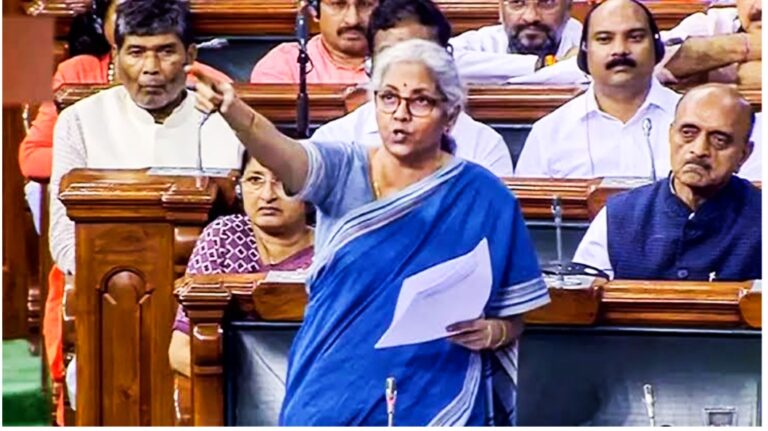CGST (Second Amendment) Bill 2023 Passed in the Lok Sabha: Age Limit of President and Members of GST Appellate Tribunal Set at 70 and 67 Respectively. Taxpayers can Withdraw Cases from High Court or Supreme Court and Appeal to Tribunals for Faster Resolution.
In a significant move on December 19, 2023, the Lok Sabha approved the Central Goods and Services Tax (Second Amendment) Bill 2023, introducing crucial changes to the age limits for the president and members of the GST appellate tribunal (GSTAT) and fixing eligibility of senior advocates having 10 years experience in indirect taxes to become members of the GST Appellate Tribunal.
The Ministry was made aware by the Chief Justice of India, in his administrative capacity, through the Supreme Court registry, that the qualifications specified in the CGST Act for the GST Appellate Tribunal did not align with the Tribunal Reforms Act 2021.
During her address in the Lok Sabha, Finance Minister Sitharaman highlighted two key concerns raised by the CJI:
(1) The CGST Act sets the maximum age limit for the President of the Appellate Tribunal and members at 67 and 65 years, respectively, while the Tribunal Reforms Act 2021 specifies these limits as 70 and 67 years.
(2) The CGST Act lacks a provision regarding the eligibility of an advocate with a standing of 10 years at the bar for appointment as a judicial member, a provision present in the Tribunal Reforms Act 2021.
In response to these issues, the current amendment bill has been introduced in the Lok Sabha. This amendment aims to address the disparities and bring the CGST Act in line with the provisions of the Tribunal Reforms Act 2021.
Spearheaded by Finance Minister Nirmala Sitharaman, the bill passed in Lok Sabha aims to address key concerns and streamline the resolution of the following GST related cases.
Age Limit Increase:
The amended bill proposes an increase in the age limit for the president and members of GSTAT, now set at 70 years and 67 years, respectively. This adjustment, up from the previous 67 and 65 years, aligns with contemporary needs and allows for a more experienced and efficient tribunal.
Eligibility Criteria:
Under the amended bill passed in Lok Sabha, advocates with 10 years of substantial experience in litigating indirect tax matters are eligible for appointment as judicial members of GSTAT. This move ensures a pool of qualified individuals contributing to the effective functioning of the tribunal.
Term of Office:
The amended bill stipulates that the president and members of GSTAT, whether judicial or technical, will hold office for four years or until reaching the age of 70 years and 67 years, respectively, whichever is earlier. This provision aims to provide stability and continuity in the tribunal’s leadership.
Streamlining Case Resolution:
Finance Minister Sitharaman emphasized that taxpayers engaged in litigations against GST demands in higher courts can withdraw their cases and approach GSTAT once the benches are operational. This strategic shift is anticipated to expedite case outcomes, offering a more efficient and faster alternative for dispute resolution.
Geographical Accessibility:
Addressing concerns about accessibility, Sitharaman highlighted that every state will have two tribunal benches, strategically located in the state capital and key commercial centres. This decentralization is designed to ensure widespread accessibility for taxpayers across the country.
Provisional Collection of Taxes Bill:
In addition to the GST amendments, the Lok Sabha also cleared the Provisional Collection of Taxes Bill, 2023. This bill, aimed at curbing speculative trading activities, grants immediate effect to customs and excise duty impositions or hikes.
Future Implications:
As the amendments pave the way for the establishment of GST appellate tribunals, taxpayers are encouraged to consider the option of withdrawing their cases from higher courts and leveraging the upcoming tribunals for quicker resolutions.
GST Council’s Larger Exercise:
Finance Minister Sitharaman acknowledged concerns about glitches, difficulties faced by taxpayers, and the complexity of multiple tax rates. She reassured that the rationalization of rates is part of a broader exercise undertaken by the GST Council. A Group of Ministers within the council is actively working on rate rationalization to simplify the tax structure.
Conclusion:
In conclusion, the Lok Sabha’s approval of these amendments marks a significant stride towards a more efficient and accessible GST dispute resolution system, with an eye on addressing taxpayer concerns and ensuring smoother compliance.
To Access the CBIC Instruction 5/2023 for GST Officers CLICK HERE
READ MORE
